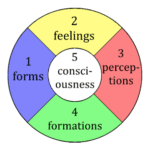List of 24 meditation positives:
- Understanding the mind
- Emotional Well-being and regulation
- Resistance to illness
- Deeper concentration
- Extended Focus
- Release of Stress
- Ability to handle stress
- Increased confidence
- Less need for sleep
- Better learning skills
- More attuned to others
- Improved and stabilized moods
- Greater awareness of speech and its effect on others
- Insights into the more profound aspects of reality
- Joy
- Increased empathy
- Greater compassion
- Better memory
- Superior cognition
- Enhanced resistance to cognitive dysfunction in old age
- Greatly increased impulse control
- Subtle insights into the body and one’s physicality
- Greater presence in life
- Ability to rewire the cognitive processes.
Table of Contents

This list of meditation positives could go on much longer. A number of spiritual benefits can be listed. With sufficient meditative attainment, supernormal powers can allegedly be obtained. These are not really the point, however, and those who attain them generally use them to benefit others.
T
What are the top 10 benefits of meditation?
- Emotional Well-being and regulation
- Resistance to illness
- Extended Focus
- Ability to handle stress
- Better learning skills
- Insights into the more profound aspects of reality
- Joy and compassion grow
- Better memory
- Enhanced resistance to cognitive dysfunction in old age
- Ability to rewire the cognitive processes.
Emotional Well-being and regulation
Meditation is one of the best treatments for anxiety sufferers.
Emotional well-being is a multifaceted aspect of mental health that encompasses the ability to understand, manage, and express emotions in a constructive manner. Meditation has been linked to improvements in emotional well-being through its impact on emotional regulation. Research has shown that regular meditation practice is associated with heightened self-awareness and increased emotional intelligence, enabling individuals to recognize and understand their emotions more effectively1.
Moreover, a study published in Psychological Science found that mindfulness meditation enhances the brain’s ability to regulate emotions by increasing activity in the prefrontal cortex, a region associated with emotional control2. This suggests that meditation may serve as a valuable tool for cultivating emotional resilience and fostering a more positive emotional state. As individuals engage in mindfulness practices, they develop a heightened sense of emotional self-regulation, contributing to an overall improvement in emotional well-being.
- Frontiers in Psychology – “Emotional Intelligence and Mindfulness in Adolescents: A Training Study”: https://www.frontiersin.org/articles/10.3389/fpsyg.2018.01146/full ↩
- Psychological Science – “Mindfulness practice leads to increases in regional brain gray matter density”: https://journals.sagepub.com/doi/abs/10.1177/0956797612449659 ↩
Meditation Positive #2: Resistance to Illness
Meditation, beyond its recognized benefits for mental health, has also shown promise in bolstering the body’s resistance to illness. Scientific studies suggest a connection between regular meditation practice and an enhanced immune system. A study published in Psychosomatic Medicine found that mindfulness meditation is associated with alterations in both brain function and immune response, leading to a potential reduction in inflammatory processes1.
Chronic inflammation is often linked to various health issues, including a weakened immune system. By mitigating inflammation, meditation may contribute to improved immune function, ultimately enhancing the body’s ability to resist illnesses. While further research is needed to fully elucidate the intricate mechanisms at play, the existing evidence points towards meditation as a potential ally in promoting not only mental well-being but also physical resilience against common ailments.
- Psychosomatic Medicine – “Alterations in Brain and Immune Function Produced by Mindfulness Meditation”: https://www.ncbi.nlm.nih.gov/pmc/articles/PMC4940234/ ↩
How to meditate like a yogi
and enter profound samadhi
Meditation positive #3: Extended focus from meditation
Meditation is renowned for its ability to cultivate extended focus, providing individuals with a powerful tool to navigate the demands of our increasingly distracted world. Through techniques such as mindfulness meditation, practitioners learn to direct and sustain their attention on a chosen focal point, often the breath or present moment. A study published in Psychological Science found that individuals engaged in mindfulness training exhibited improvements in attention and cognitive skills, emphasizing the capacity of meditation to enhance sustained focus1.
Moreover, the practice of extended focus in meditation is linked to changes in brain structure, particularly in areas associated with attention and sensory processing2. As individuals consistently train their minds to remain attentive for extended periods, they develop resilience against the constant barrage of distractions, fostering a heightened ability to concentrate on tasks, make thoughtful decisions, and maintain a sustained focus in various aspects of their lives.
- Psychological Science – “Mindfulness practice leads to increases in regional brain gray matter density”: https://journals.sagepub.com/doi/abs/10.1177/0956797612449659 ↩
- Frontiers in Human Neuroscience – “Alterations in Brain Structure and Amplitude of Low-frequency after 8 weeks of Mindfulness Meditation
Meditation Positive #4: Ability to handle stress
Meditation stands as a formidable ally in cultivating the ability to handle stress. Numerous studies have consistently shown that engaging in mindfulness meditation can significantly reduce stress levels. A meta-analysis published in JAMA Internal Medicine concluded that mindfulness meditation programs are effective in mitigating symptoms of anxiety and stress1.
Through practices that encourage present-moment awareness and the development of a non-reactive mindset, individuals can learn to respond to stressors with greater equanimity. Furthermore, research has demonstrated tangible physiological benefits, with regular meditation linked to lower cortisol levels, a key stress hormone2. As individuals incorporate meditation into their daily routines, they often report increased resilience, improved emotional regulation, and a heightened capacity to navigate life’s challenges with a greater sense of calm and clarity.
- JAMA Internal Medicine – “Meditation Programs for Psychological Stress and Well-being”: https://jamanetwork.com/journals/jamainternalmedicine/fullarticle/1809754 ↩
- Psychoneuroendocrinology – “Alterations in brain and immune function produced by mindfulness meditation”: https://www.sciencedirect.com/science/article/abs/pii/S0306453009000904 ↩



Meditation Positive #5: Better learning skills
Indeed, meditation has been associated with improvements in learning skills and cognitive abilities. Research suggests that engaging in mindfulness meditation can enhance various aspects of the learning process. One key benefit is the positive impact on attention and concentration. Through practices that emphasize sustained focus, individuals develop the ability to direct their attention to the task at hand, fostering an optimal environment for learning. A study published in Psychological Science found that even a short period of mindfulness training resulted in improved attention and working memory capacity1.
Additionally, meditation has been linked to changes in brain structure that may contribute to better learning outcomes. Long-term practitioners have demonstrated increased gray matter density in brain regions associated with memory, learning, and self-awareness2. This suggests that the structural changes induced by meditation might play a role in enhancing cognitive functions.
Furthermore, the cultivation of mindfulness through meditation can lead to a reduction in stress and anxiety, which are known impediments to effective learning. By promoting emotional regulation and a calm state of mind, meditation creates a conducive environment for absorbing and retaining new information.
- Psychological Science – “Mindfulness practice leads to increases in regional brain gray matter density”: https://journals.sagepub.com/doi/abs/10.1177/0956797612449659 ↩
- Psychological Science – “Mindfulness practice leads to increases in regional brain gray matter density”: https://journals.sagepub.com/doi/abs/10.1177/0956797612449659 ↩
Meditation Positive #6: Insights into the more profound aspects of reality
Meditation serves as a gateway to profound insights into the nature of reality, offering individuals a transformative journey inward. By quieting the mind and fostering a heightened state of awareness, meditation allows practitioners to transcend the surface of everyday experiences and delve into the depths of consciousness. Through contemplative practices, individuals often report a deepening sense of interconnectedness, a heightened awareness of the present moment, and an expanded perspective on the nature of existence.
Such insights go beyond intellectual understanding and can lead to a profound shift in one’s worldview. Research on long-term meditation practitioners suggests that these contemplative experiences may be associated with changes in brain function and connectivity, providing a neurobiological basis for the profound insights often reported by those engaged in regular meditation practices. In essence, meditation becomes a vehicle for exploring the more profound dimensions of reality, fostering a richer and more meaningful understanding of existence.
Meditation Positive #7: Joy and compassion grow
Meditation serves as a potent catalyst for the cultivation of joy and compassion, fostering a transformative inner landscape. Mindfulness and loving-kindness meditation practices, in particular, have been associated with the development of positive emotions. By directing attention to the present moment and promoting a non-judgmental awareness, individuals often experience an upsurge in feelings of joy and contentment.
Moreover, loving-kindness meditation encourages the intentional generation of feelings of compassion and goodwill towards oneself and others. Studies have shown that regular meditation can lead to structural changes in the brain associated with positive emotions and empathy. For instance, research published in Psychological Science highlights the link between mindfulness meditation and increased activity in brain regions related to positive affect1.
As individuals engage in meditation over time, it becomes a powerful tool for nurturing the growth of joy and compassion, enriching both their inner lives and interpersonal relationships.
- Psychological Science – “Mindfulness practice leads to increases in regional brain gray matter density”: https://journals.sagepub.com/doi/abs/10.1177/0956797612449659 ↩
Meditation Positive #8: Better memory
Meditation has emerged as a promising strategy for enhancing memory function. Through practices that emphasize focused attention and mindfulness, individuals engage in a mental exercise that strengthens their ability to retain and recall information. Research indicates that meditation can positively impact both short-term and long-term memory. A study published in Psychological Science found that individuals who underwent mindfulness training demonstrated improvements in working memory capacity and sustained attention1.
Additionally, the structural changes in the brain associated with regular meditation, such as increased gray matter density in memory-related regions, suggest a neurobiological basis for the observed improvements2. As meditation encourages a state of relaxed alertness and a reduction in stress, it creates an optimal environment for effective learning and memory consolidation. Therefore, incorporating meditation into daily routines may serve as a practical and holistic approach for individuals seeking to enhance their memory abilities.
- Psychological Science – “Mindfulness practice leads to increases in regional brain gray matter density”: https://journals.sagepub.com/doi/abs/10.1177/0956797612449659 ↩
- Psychological Science – “Mindfulness practice leads to increases in regional brain gray matter density”: https://journals.sagepub.com/doi/abs/10.1177/0956797612449659 ↩
Meditation Positive #9: Enhanced resistance to cognitive dysfunction in old age
Meditation emerges as a potential guardian against cognitive decline in aging, contributing to enhanced resistance to cognitive dysfunction. Scientific investigations have shown that regular meditation practices, particularly mindfulness meditation, can positively influence cognitive functions and mitigate age-related decline. A study published in the journal NeuroImage revealed that individuals with extensive meditation experience exhibited less age-related gray matter atrophy in the brain, particularly in regions associated with memory and cognition1.
Furthermore, meditation’s stress-reducing effects may play a crucial role in preserving cognitive function, as chronic stress is a known contributor to cognitive decline. By fostering neuroplasticity and supporting overall brain health, meditation stands as a promising strategy for promoting cognitive resilience in older adults, potentially offering a proactive approach to maintaining cognitive well-being as individuals age.
- NeuroImage – “The underlying anatomical correlates of long-term meditation: Larger hippocampal and frontal volumes of gray matter”: https://www.sciencedirect.com/science/article/pii/S1053811906006537
Meditation Positive #10: Ability to rewire the cognitive processes.
Meditation possesses a transformative potential in rewiring cognitive processes, offering a unique avenue to reshape the way individuals perceive and interact with the world. Through consistent and intentional practice, meditation creates neuroplastic changes in the brain, particularly in regions associated with attention, self-awareness, and emotional regulation.
Research, such as a study published in Psychological Science, demonstrates that mindfulness meditation leads to increases in regional brain gray matter density, suggesting a malleability of the brain’s structure influenced by meditative practices1.
Individuals can actively participate in the sculpting of their cognitive architecture, fostering traits like heightened attention, improved memory, and emotional resilience. By encouraging a deliberate and focused awareness, meditation becomes a powerful tool for individuals seeking to rewire cognitive processes, facilitating a more adaptive and mindful approach to daily life.
The ability to rewire cognitive processes means that if you are anxious, depressed, or unhappy you can change the processes that create that situation. There are a number of ways to do this. With a greater understanding of how the mind operates, the causes of unhappiness, anger, depression, fear, and so forth, the emotions can be rewired so that the mind receives benefit from them instead of harm.
- Psychological Science – “Mindfulness practice leads to increases in regional brain gray matter density”: https://journals.sagepub.com/doi/abs/10.1177/0956797612449659 ↩

May all beings be happy
May all beings be peaceful
May all beings be safe
May all beings awaken to the light of their true nature
May all beings be free







